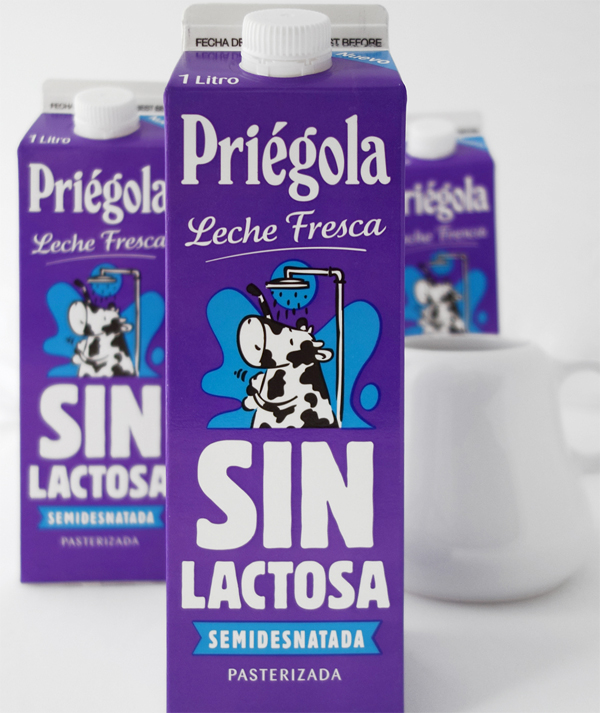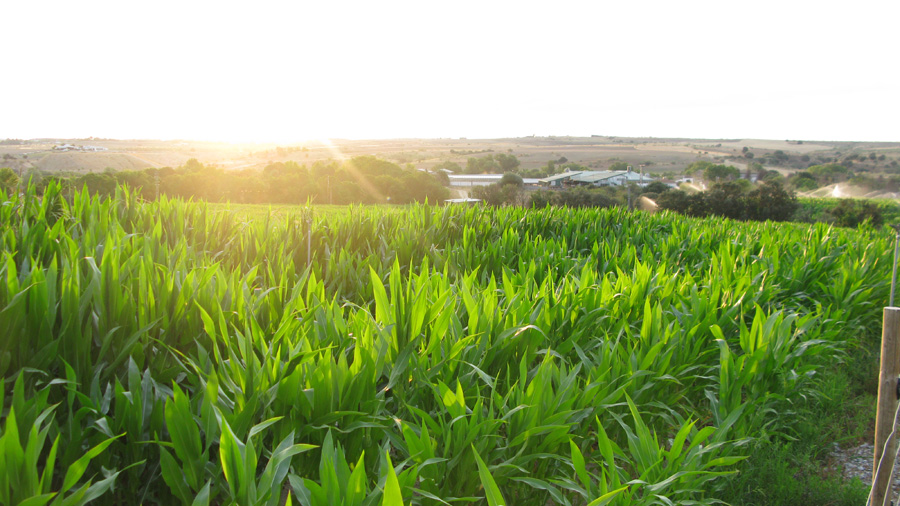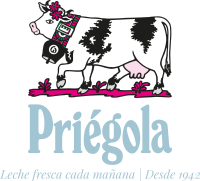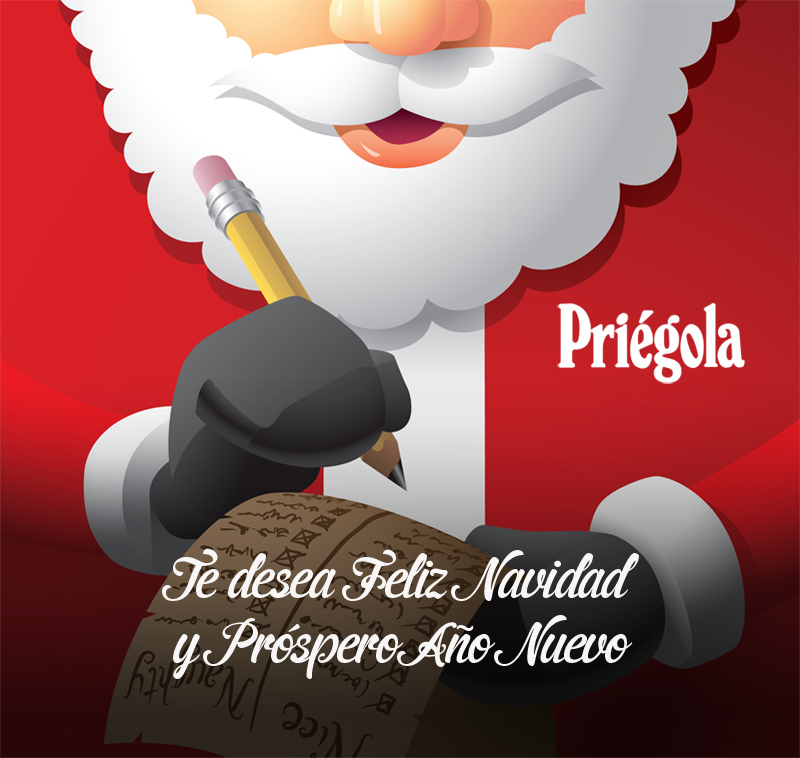Dos partos y un biberón en Priégola
Esta madrugada han nacido dos terneros y aunque ya se ponen de pie todavía no saben donde conseguir leche... sus madres no son primerizas y el instinto natural de los terneros les hará encontrar la ubre materna. Es importante que beban la primera leche de la ubre de su madre ya que contiene el calostro, una leche con muchas propiedades nutritivas e inmunizantes.
https://vimeo.com/90730367
y si no siempre está el biberón de 2 litros!
https://vimeo.com/90735581
Fresh milk without lactose Arpon
Arpon launches its new range of "No lactose" fresh milk

In order to meet the needs of lactose intolerant consumers, Arpon has launched its new range of
Fresh milk semi-skimmed lactose-free
To learn about this new product, Arpon will deliver a free sample to all its customers paid to in-home service, in the next few days.
Lactose is a sugar that is present in all mammalian milk: cow, goat, sheep and human, and which can also be found in many prepared foods. It is called sugar of milk, natural disaccharide composed of glucose and galactose.
Lactose intolerance means there is not enough of the enzyme (lactase) to break any lactose consumed in the small intestine. Partially digested or undigested lactose will go down in the large intestine and is there that it is broken down by bacteria in the large intestine, generating substances from disposal and fatty acids, which cause all their symptoms: headaches, bloating, diarrhea, etc. It is also known as milk intolerance or intolerance to dairy products, lactase deficiency.
We are confident that this new product is to the liking of all those consumers who suffer from lactose intolerance.
Leche Fresca Priégola Sin Lactosa
Priégola lanza al mercado su nueva variedad de leche fresca "Sin Lactosa"

Con el objeto de satisfacer las necesidades de los consumidores intolerantes a la lactosa, Priégola ha lanzado al mercado su nueva variedad de
Leche Fresca Semidesnatada SIN LACTOSA
Para dar a conocer este nuevo producto, Priégola entregará una muestra gratuita a todos sus clientes abonados al servicio a domicilio, en los próximos días.
La lactosa es un azúcar que está presente en todas las leches de los mamíferos: vaca, cabra, oveja y en la humana, y que también puede encontrarse en muchos alimentos preparados. Es el llamado azúcar de la leche, disacárido natural compuesto de glucosa y galactosa.
La intolerancia a la lactosa significa que no hay suficiente enzima (lactasa) en el intestino delgado para romper toda la lactosa consumida. La lactosa digerida parcialmente o no digerida pasará al intestino grueso y es allí que es descompuesta por las bacterias del intestino grueso, generando las sustancias de desecho y ácidos grasos, que provocan todos sus síntomas: dolores, hinchazón abdominal, diarrea, etc. También es conocida como intolerancia a productos lácteos, deficiencia de lactasa o intolerancia a la leche.
Confiamos en que este nuevo producto sea del agrado de todos aquellos consumidores que sufran de intolerancia a la lactosa.
Thank you my Petit Madrid!
[Fuente: Blog Mi Petit Madrid - De Carla, el 04 de diciembre de 2013]
COMFORT & SLOW COW MiLK: happy cows of Arpon

Did you know a dealer can get milk just to your home, first thing in the morning, which live in the Centre or on the outskirts of the village? Yes, Yes, as in the films (American)! Every day, Arpon, the estate of Villanueva del Pardillo of Hans-Peter and Rachel, where 1,400 Frisian cows, living at ease and stress-free distributed fresh milk to more than 5,000 homes in the community of Madrid. The recipe for your success? The "Cow Comfort". This test? Both the family business and founder marriage just celebrate their respective golden wedding anniversary. Petit tribute to livestock more slow moment.
In 1960, Hans-Peter Sieber left his native Switzerland to work as an interpreter in the Costa Brava but love knocked at the door of your destination to meet his current wife of Cantabrian origins, Raquel Quijano. Shortly after, the happy couple decided to settle in no man's land to fulfill his dream: founding their own livestock. Nothing more moving to Villanueva del Pardillo, bought their first 30 cows in... Canada. Yes, they made them to travel thousands of miles aboard a plane of the company Iberia before no doubt the bewilderment of the crew. Since then, Arpon family has grown and much but in a methodical, almost philosophical manner, because, for its owners, a happy cow produces better milk. And I attest that this breeding cows live "as authentic Queens" thanks to the "Cow Comfort" method.
It is a set of techniques that favor well-being and tranquility of the animals in order to increase not only the quality of the milk but also its production. Then, on this farm, all cows are born and breed in the farm with the help of artificial insemination; they have enough space to walk; and they sleep in beds of water or rubber blended with pillows to rest your head. "The surface of the bed has to be padded so that the knees of cows will not suffer to the lie" explains Nicolás Sieber, the son of the owners, who grew up on the farm and knows very well the nature of these animals. "If you don't do them case, cows are curious, come to your attention. If you are where you come, frightened".
As for milk, cows are milked three times a day, seven days a week, 365 days a year (+ 1 every 4). During the time of milking, they listen to classical music, and not by any composer, it seems that the music of Mozart is that like... "It is said that this technique is used since, in the 19th century, monks of Brittany discovered that cows gave more milk during the mass, as they heard the music that came from the choir of the Church," says Nicolas.
Finally, in summer, sprinklers and fans regulate the temperature in the feeders and the cobertizos-dormitorios areas because it is proven that the cattle begin to suffer if the thermometer marked more than 22 degrees Celsius. And to finish, they themselves may be a masajito with a power brush that rotates automatically when the cow approached it... are giving Me envy! Aysss, who was a cow! In Arpon, clear.
Click here to view the article in the original blog
¡Gracias Mi Petit Madrid!
[Fuente: Blog Mi Petit Madrid - De Carla, el 04 de diciembre de 2013]
COW COMFORT & SLOW MiLK: LAS VACAS FELiCES DE PRiÉGOLA

¿Sabías que un repartidor puede llevarte leche recién ordeñada a tu casa, a primera hora de la mañana, que vivas en el centro o en las afueras de la Villa? Sí, sí, ¡como en las películas (americanas)! Cada día, Priégola, la finca de Villanueva del Pardillo de Hans-Peter y Raquel, donde viven a sus anchas y sin estrés 1.400 vacas Frisonas, reparte leche fresca a más de 5.000 hogares de la Comunidad de Madrid. ¿La receta de su éxito? El “Cow Comfort”. ¿Prueba de ello? Tanto el negocio familiar como el matrimonio fundador acaban de celebrar sus respectivas Bodas de Oro. Petit homenaje a la Ganadería más slow del momento.
En 1960, Hans-Peter Sieber dejó su Suiza natal para trabajar como intérprete en la Costa Brava pero el amor llamó a la puerta de su destino al conocer a su actual esposa de origen cántabro, Raquel Quijano. Al poco tiempo, la pareja feliz decidió instalarse en tierra de nadie para cumplir su sueño: fundar su propia ganadería. Nada más trasladarse a Villanueva del Pardillo, compraron sus primeras 30 vacas en... Canadá. Sí, las hicieron viajar miles de kilómetros a bordo de un avión de la compañía Iberia ante sin duda el desconcierto de la tripulación. Desde entonces, la familia Priégola ha crecido y mucho pero de manera metódica, casi filosófica, porque, para sus dueños, una vaca feliz produce mejor leche. Y yo doy fe de que las vacas de esta ganadería viven “como auténticas reinas” gracias al método "Cow Comfort".
Se trata de un conjunto de técnicas que favorecen el bienestar y la tranquilidad de los animales con el fin de aumentar no solo la calidad de la leche sino también su producción. Entonces, en esta finca, todas las vacas nacen y se reproducen en la propia granja con la ayuda de la inseminación artificial; tienen espacio suficiente para caminar; y duermen en camas individuales de agua o de goma triturada con almohadas para reposar la cabeza. “La superficie de las camas tiene que ser acolchada para que las rodillas de las vacas no sufran al tumbarse” nos explica Nicolás Sieber, el hijo de los dueños, que se crió en la finca y conoce muy bien el carácter de estos animales. “Si no les haces caso, las vacas son curiosas, se acercan para llamar tu atención. Si eres tú el que te acercas, se asustan”.
En cuanto a la leche, las vacas son ordeñadas tres veces al día, los siete días de la semana, los 365 días del año (+1 cada 4). Durante la hora del ordeño, escuchan música clásica, y no de cualquier compositor, parece que la música de Mozart es la que más les gusta... “Se dice que esta técnica se utiliza desde que, en el siglo XIX, unos monjes de la Bretaña francesa descubrieran que las vacas daban más leche durante la misa, mientras escuchaban la música que provenía del coro de la iglesia”, asegura Nicolás.
Finalmente, en verano, aspersores y ventiladores regulan la temperatura en la zonas de los comederos y de los cobertizos-dormitorios porque está probado que el ganado vacuno empieza a sufrir si el termómetro marca más de 22 grados centígrados. Y para rematar, ellas mismas pueden darse un masajito con un cepillo eléctrico que gira de forma automática cuando la vaca se aproxima a él… ¡Me están dando una envidia! ¡Aysss, quién fuera vaca! En Priégola, claro.
Pincha aquí para ver el articulo en el blog original
Good harvest of corn... good food for our cows.

At the end of the month of may, after harvesting the barley, we started planting corn on the grounds of irrigated Arpon has to do this. Today, two months later and seeing as sprouting cultivation can ensure that the harvest will be good.
A good harvest of maize is important because it depends much of our cows feeding in the coming months. This crop will begin to harvest in September and will serve as a forage food from our dairy cows.
One of the advantages of Arpon is the have 160 hectares (intended for maize irrigation 25) to cultivate their own fodder and thus:
- It ensures that the quality of farmed products is optimal because it directly affects the health of the cows and the taste of her milk.
- The farm allows independent oscillations of fodder prices in the domestic market. These prices have two years to increase by strong external demand and the production costs of many Spanish farms are unworkable to avocando them to a close.
The photos that we show in this publication have been taken yesterday afternoon and this morning.
Buena cosecha de Maiz... buena comida para nuestras Vacas.

A finales del mes de Mayo, después de cosechar la cebada, comenzamos a sembrar el maíz en los terrenos de regadío que Priégola dispone para ello. Hoy, dos meses después y viendo como brota el cultivo podemos asegurar que la cosecha será buena.
Una buena cosecha de maíz es importante porque de ella depende gran parte de la alimentación de nuestras vacas en los meses venideros. Este cultivo se comenzará a cosechar en septiembre y servirá como alimento forrajero de nuestras vacas lecheras.
Una de las ventajas de Priégola es la de disponer de 160 hectáreas (25 de regadío destinadas a cultivo de maíz) para cultivar sus propios forrajes y con ello:
- Asegura que la calidad de los productos cultivados sea óptima porque ello afecta directamente a la salud de las vacas y al sabor de su leche.
- Permite a la granja ser independiente de las oscilaciones de precios de forrajes en el mercado nacional. Estos precios llevan dos años incrementándose por la fuerte demanda exterior y los costes de producción de muchas granjas españolas son inviables avocándolas a su cierre.
Las fotos que os mostramos en esta publicación han sido tomadas en la tarde de ayer y esta misma mañana.
Ibiza has dairy
Source: detodoenibiza.com - date: 01-05-2013
A few days ago the website of Ibiza "www.detodoenibiza.com", "The field of Ibiza" section published an article under the title of "The dairy esta de Vuelta" where in addition to praise this profession, he mentioned to Arpon and therefore, we wanted to share with you this article, fully playing its contents:
Several decades ago, expansion in Western supermarkets, hypermarkets and small neighborhood stores, as well as the change of habits in many homes led to the edge of the disappearance to the popular figure of the dairy. However, for the last several years, cities and towns of the United States, United Kingdom and other European countries, including Spain, attending a progressive expansion of the delivery service of milk and other dairy products and fresh at home. Who doesn't remember endearing figure of the milkman carrying fresh milk to houses? The return of the milkman's life should be framed in the growing trend in our society to return to the traditional, natural and simple and the consumption of fresh and local products.
Today, almost three thousand dairy distributed each morning nearly one million liters in the households of the United Kingdom. It should be recalled as the dairy carries among the British for more than 150 years and has always enjoyed an enormous sympathy and popularity. In Spain, are already several companies which have established dairy home delivery services, such as the well-known Arpon company that distributes milk and other products with great success dairy in the community of Madrid.
The freshness of the milk, milked and packaged the same day and distributed maximum a day later, is the aspect most valued by customers of such services. Very similar to the earlier, milk with an unmistakable flavour but with the guarantee of health that gives its pasteurization (process by which natural milk is subjected to the action of the heat to kill pathogenic germs).
Most of the services at home from fresh milk and dairy products offer general other clear advantages to the consumer:
- The convenience of receiving products at home, saving time and money.
- The prices tend to be very similar to the supermarkets.
- This type of service allows you to support the local product and develop a sustainable local economy.
In Ibiza we are in luck because in may 2013, Santa Gertrudis farm started a dairy home delivery service. It will initially be in the zone of Santa Gertrudis to then expand to the rest of the island. Ibiza has dairy!





